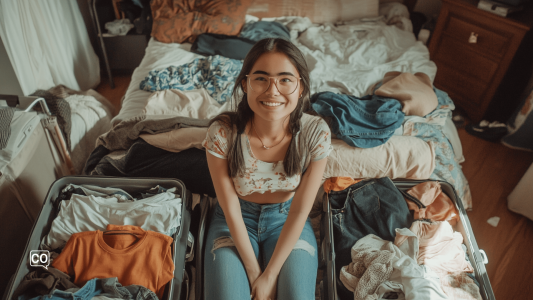Hacer tu equipaje

Learning goals:
- Situation: Hacer la maleta (Packing the luggage)
- Situation: Vocabulario sobre lo que hay en tu equipaje (Vocabulary about what's in your luggage)
- Verb: Hacer (to do) - Pretérito perfecto, indicativo (Present Perfect, indicative)
- Verb: Poner (to put) - Pretérito perfecto, indicativo (Present Perfect, indicative)
- Grammar: Verbos irregulares en el pretérito perfecto (Irregular verbs in the present perfect)
- Culture: ¿Qué lleva un peregrino en la mochila? (What does a pilgrim carry in their rucksack?)
Learning module 1 (A2): Viajar: ¡A lo desconocido! (Travelling: into the wild!)
Teaching guidelines +/- 60 minutes
Exercises
These exercises can be done together during conversation lessons or as homework.
Exercise 1: Find the words
Instruction: Find the words, mark them and make sentences with the words.
Show answers Show hintsHints
The towel , The underwear , The suitcase , The bikini , The sunglasses , To fill
Answers
Score: 0/6
| Las gafas de sol | (The sunglasses) |
| El biquini | (The bikini) |
| La ropa interior | (The underwear) |
| La maleta | (The suitcase) |
| Llenar | (To fill) |
| La toalla | (The towel) |
Exercise 2: Reorder sentences
Instruction: The words in these sentences have been shuffled! Sort them so that they make a valid sentence again and translate.
Show answers Show translationExercise 3: Translate and use in a sentence
Instruction: Translate and say the word out loud. Use the word in a sentence.
Show translation|
1.
La ropa interior
|
(The underwear) |
|
2.
Llenar
|
(To fill) |
|
3.
La gorra
|
(The baseball cap) |
|
4.
Deshacer
|
(To unpack) |
|
5.
La mochila
|
(The backpack) |
|
6.
Las gafas de sol
|
(The sunglasses) |
|
7.
La toalla
|
(The towel) |
|
8.
El biquini
|
(The bikini) |
Exercise 4: Translate and make sentences
Instruction: Translate the words and phrases below and use it in a conversation or text.
Show answersExercise 5: Conjugación verbal
Instruction: Choose the correct word, read the sentence out loud and translate.
Show answers Show translationPoner (Pretérito perfecto, indicativo), Hacer (Pretérito perfecto, indicativo)
1. Yo ... la maleta para el vuelo de mañana.
2. Vosotros ... las maletas en el bus de la excursión.
3. Nosotras ... planes para viajar en avión este verano.
4. Ellas ... muchas excursiones desde temprano.
5. Él ... una excursión hasta la montaña.
6. Tú ... una excursion en la ciudad con el guía turístico.
7. Él ... el plan de viaje en la mesa.
8. Tú ... los billetes de avión sobre la mesa.
Exercise 6: Irregular verbs in the present perfect
Instruction: Choose the correct word, read the sentence out loud and translate.
Show answers Show translationvuelto, dicho, puesto, hecho, muerto, visto, abierto, cubierto, roto, escrito
1. Decir: ¡Te he ... toda la verdad!
2. Volver: ¿Has ... ya de vacaciones?
3. Poner: ¿Quién ha ... aquí esta toalla?
4. Ver: No he ... tu bolso.
5. Romper: Alguien ha ... mis gafas de sol.
6. Hacer: Carla y Pablo todavía no han ... sus maletas.
7. Escribir: ¿Quién ha ... esto?
8. Abrir: Ellas han ... la mochila.
9. Cubrir: Nosotras nos hemos ... porque hace frío.
10. Morir: Tranquila, nadie ha ....
Exercise 7: Translate and make sentences
Instruction: Translate the words and phrases below and use it in a conversation or text.
Show answers